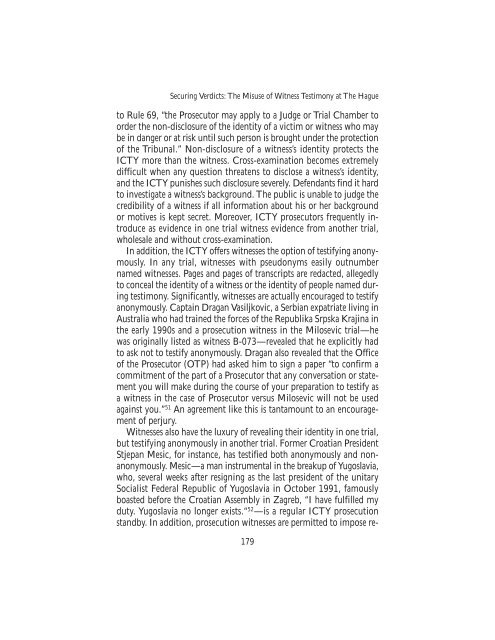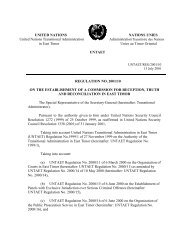The Srebrenica Massacre - Nova Srpska Politicka Misao
The Srebrenica Massacre - Nova Srpska Politicka Misao
The Srebrenica Massacre - Nova Srpska Politicka Misao
You also want an ePaper? Increase the reach of your titles
YUMPU automatically turns print PDFs into web optimized ePapers that Google loves.
Securing Verdicts: <strong>The</strong> Misuse of Witness Testimony at <strong>The</strong> Hague<br />
to Rule 69, “the Prosecutor may apply to a Judge or Trial Chamber to<br />
order the non-disclosure of the identity of a victim or witness who may<br />
be in danger or at risk until such person is brought under the protection<br />
of the Tribunal.” Non-disclosure of a witness’s identity protects the<br />
ICTY more than the witness. Cross-examination becomes extremely<br />
difficult when any question threatens to disclose a witness’s identity,<br />
and the ICTY punishes such disclosure severely. Defendants find it hard<br />
to investigate a witness’s background. <strong>The</strong> public is unable to judge the<br />
credibility of a witness if all information about his or her background<br />
or motives is kept secret. Moreover, ICTY prosecutors frequently introduce<br />
as evidence in one trial witness evidence from another trial,<br />
wholesale and without cross-examination.<br />
In addition, the ICTY offers witnesses the option of testifying anonymously.<br />
In any trial, witnesses with pseudonyms easily outnumber<br />
named witnesses. Pages and pages of transcripts are redacted, allegedly<br />
to conceal the identity of a witness or the identity of people named during<br />
testimony. Significantly, witnesses are actually encouraged to testify<br />
anonymously. Captain Dragan Vasiljkovic, a Serbian expatriate living in<br />
Australia who had trained the forces of the Republika <strong>Srpska</strong> Krajina in<br />
the early 1990s and a prosecution witness in the Milosevic trial—he<br />
was originally listed as witness B-073—revealed that he explicitly had<br />
to ask not to testify anonymously. Dragan also revealed that the Office<br />
of the Prosecutor (OTP) had asked him to sign a paper “to confirm a<br />
commitment of the part of a Prosecutor that any conversation or statement<br />
you will make during the course of your preparation to testify as<br />
a witness in the case of Prosecutor versus Milosevic will not be used<br />
against you.” 51 An agreement like this is tantamount to an encouragement<br />
of perjury.<br />
Witnesses also have the luxury of revealing their identity in one trial,<br />
but testifying anonymously in another trial. Former Croatian President<br />
Stjepan Mesic, for instance, has testified both anonymously and nonanonymously.<br />
Mesic—a man instrumental in the breakup of Yugoslavia,<br />
who, several weeks after resigning as the last president of the unitary<br />
Socialist Federal Republic of Yugoslavia in October 1991, famously<br />
boasted before the Croatian Assembly in Zagreb, “I have fulfilled my<br />
duty. Yugoslavia no longer exists.“ 52 —is a regular ICTY prosecution<br />
standby. In addition, prosecution witnesses are permitted to impose re-<br />
179



